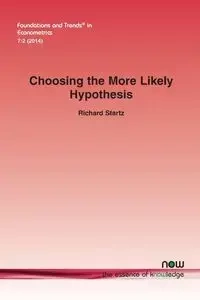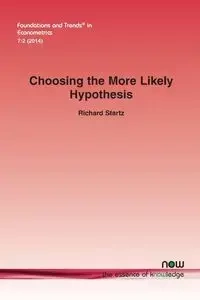Choosing the More Likely Hypothesis - Richard Startz
Choosing the More Likely Hypothesis - Richard Startz
AutorzyRichard Startz
EAN: 9781601988980
Marka
Symbol
818GHT03527KS
Rok wydania
2014
Elementy
90
Oprawa
Miekka
Format
15.6x23.4cm
Język
angielski

Bez ryzyka
14 dni na łatwy zwrot

Szeroki asortyment
ponad milion pozycji

Niskie ceny i rabaty
nawet do 50% każdego dnia
Niepotwierdzona zakupem
Ocena: /5
Marka
Symbol
818GHT03527KS
Kod producenta
9781601988980
Rok wydania
2014
Elementy
90
Oprawa
Miekka
Format
15.6x23.4cm
Język
angielski
Autorzy
Richard Startz

Much of economists' statistical work centers on testing hypotheses in which parameter values are partitioned between a null hypothesis and an alternative hypothesis in order to distinguish two views about the world. Our traditional procedures are based on the probabilities of a test statistic under the null but ignore what the statistics say about the probability of the test statistic under the alternative. Traditional procedures are not intended to provide evidence for the relative probabilities of the null versus alternative hypotheses, but are regularly treated as if they do. Unfortunately, when used to distinguish two views of the world, traditional procedures can lead to wildly misleading inference. In order to correctly distinguish between two views of the world, one needs to report the probabilities of the hypotheses given parameter estimates rather than the probability of the parameter estimates given the hypotheses.
Choosing the More Likely Hypothesis shows why failing to consider the alternative hypothesis often leads to incorrect conclusions. It shows that for most standard econometric estimators, it is not difficult to compute the proper probabilities using Bayes theorem. Simple formulas that require only readily available information in standard estimation reports are provided. The author emphasizes that frequentist approaches for deciding between the null and alternative hypothesis are not free of priors. Rather, the usual procedures involve an implicit, unstated prior that is likely to be far from scientifically neutral.
EAN: 9781601988980
EAN: 9781601988980
Niepotwierdzona zakupem
Ocena: /5
Zapytaj o produkt
Niepotwierdzona zakupem
Ocena: /5
Napisz swoją opinię

